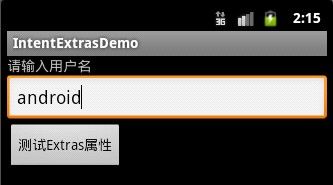Intent的简介以及属性详解
一.Intent的介绍
Intent的中文意思是“意图,意向”,在Android中提供了Intent机制来协助应用间的交互与通讯,Intent负责对应用中一次操作的动作、动作涉及数据、附加数据进行描述,Android则根据此Intent的描述,负责找到对应的组件,将 Intent传递给调用的组件,并完成组件的调用。Intent不仅可用于应用程序之间,也可用于应用程序内部的Activity/Service之间的交互。因此,可以将Intent理解为不同组件之间通信的“媒介”专门提供组件互相调用的相关信息。
二.Inten启动组件的方法
Intent可以启动一个Activity,也可以启动一个Service,还可以发起一个广播Broadcasts。具体方法如下:
| 组件名称 |
方法名称 |
|
Activity |
startActvity( ) startActivity( ) |
|
Service |
startService( ) bindService( ) |
|
Broadcasts |
sendBroadcasts( ) sendOrderedBroadcasts( ) sendStickyBroadcasts( ) |
三.Intent的属性
Intent有以下几个属性:
动作(Action),数据(Data),分类(Category),类型(Type),组件(Compent)以及扩展信(Extra)。其中最常用的是Action属性和Data属性。
1.Intent的Action属性
Action是指Intent要完成的动作,是一个字符串常量。SDK中定义了一些标准的Action常量如下表所示。
| Constant |
Target component |
Action |
| ACTION_CALL |
activity |
Initiate a phone call. |
| ACTION_EDIT |
activity |
Display data for the user to edit. |
| ACTION_MAIN |
activity |
Start up as the initial activity of a task, with no data input and no returned output. |
| ACTION_SYNC |
activity |
Synchronize data on a server with data on the mobile device. |
| ACTION_BATTERY_LOW |
broadcast receiver |
A warning that the battery is low. |
| ACTION_HEADSET_PLUG |
broadcast receiver |
A headset has been plugged into the device, or unplugged from it. |
| ACTION_SCREEN_ON |
broadcast receiver |
The screen has been turned on. |
| ACTION_TIMEZONE_CHANGED |
broadcast receiver |
The setting for the time zone has changed. |
下面是一个测试Action常量的例子:
main.xml
<?xml version="1.0" encoding="utf-8"?> <LinearLayout xmlns:android="http://schemas.android.com/apk/res/android" android:orientation="vertical" android:layout_width="fill_parent" android:layout_height="fill_parent" > <TextView android:layout_width="fill_parent" android:layout_height="wrap_content" android:text="@string/hello" /> <Button android:text="测试Action属性" android:id="@+id/getBtn" android:layout_width="wrap_content" android:layout_height="wrap_content" /> </LinearLayout>
strings.xml
<?xml version="1.0" encoding="utf-8"?> <resources> <string name="hello">测试Action属性</string> <string name="app_name">IntentActionDemo</string> </resources>
MainActivity.java
public class MainActivity extends Activity { private Button getBtn; @Override public void onCreate(Bundle savedInstanceState) { super.onCreate(savedInstanceState); setContentView(R.layout.main); getBtn=(Button)findViewById(R.id.getBtn); getBtn.setOnClickListener(new OnClickListener() { @Override public void onClick(View v) { Intent intent = new Intent(); intent.setAction(Intent.ACTION_GET_CONTENT);// 设置Intent Action属性 intent.setType("vnd.android.cursor.item/phone");// 设置Intent Type 属性 //主要是获取通讯录的内容 startActivity(intent); // 启动Activity } }); } }
效果图:
2.Intent的Data属性
Intent的Data属性是执行动作的URI和MIME类型,不同的Action有不同的Data数据指定。比如:ACTION_EDIT Action应该和要编辑的文档URI Data匹配,ACTION_VIEW应用应该和要显示的URI匹配。
3.Intent的Category属性
Intent中的Category属性是一个执行动作Action的附加信息。比如:CATEGORY_HOME则表示放回到Home界面,ALTERNATIVE_CATEGORY表示当前的Intent是一系列的可选动作中的一个。下表是SDK文档中关于Category的信息。
| Constant |
Meaning |
| CATEGORY_BROWSABLE |
The target activity can be safely invoked by the browser to display data referenced by a link — for example, an image or an e-mail message. |
| CATEGORY_GADGET |
The activity can be embedded inside of another activity that hosts gadgets. |
| CATEGORY_HOME |
The activity displays the home screen, the first screen the user sees when the device is turned on or when the HOME key is pressed. |
| CATEGORY_LAUNCHER |
The activity can be the initial activity of a task and is listed in the top-level application launcher. |
| CATEGORY_PREFERENCE |
The target activity is a preference panel. |
下面是一个回到Home界面的例子:
main.xml
<?xml version="1.0" encoding="utf-8"?> <LinearLayout xmlns:android="http://schemas.android.com/apk/res/android" android:orientation="vertical" android:layout_width="fill_parent" android:layout_height="fill_parent" > <TextView android:layout_width="fill_parent" android:layout_height="wrap_content" android:text="测试Intent Category" /> <Button android:id="@+id/Button1" android:layout_width="wrap_content" android:layout_height="wrap_content" android:text="转到Home界面" /> </LinearLayout>
strings.xml
<?xml version="1.0" encoding="utf-8"?> <resources> <string name="hello">Hello World, MainActivity!</string> <string name="app_name">IntentCategoryDemo</string> </resources>
MainActivity.java
package com.android.category.activity; import android.app.Activity; import android.content.Intent; import android.os.Bundle; import android.view.View; import android.view.View.OnClickListener; import android.widget.Button; public class MainActivity extends Activity { private Button btn; @Override public void onCreate(Bundle savedInstanceState) { super.onCreate(savedInstanceState); setContentView(R.layout.main); btn = (Button)findViewById(R.id.Button1); btn.setOnClickListener(new OnClickListener() { @Override public void onClick(View v) { Intent intent = new Intent(); intent.setAction(Intent.ACTION_MAIN);// 添加Action属性 intent.addCategory(Intent.CATEGORY_HOME);// 添加Category属性 startActivity(intent);// 启动Activity } }); } }
效果图:
4.Intent的Type属性
Intent的Type属性显式指定Intent的数据类型(MIME)。一般Intent的数据类型能够根据数据本身进行判定,但是通过设置这个属性,可以强制采用显式指定的类型而不再进行推导。
5.Intent的Compent属性
Intent的Compent属性指定Intent的的目标组件的类名称。通常 Android会根据Intent 中包含的其它属性的信息,比如action、data/type、category进行查找,最终找到一个与之匹配的目标组件。但是,如果 component这个属性有指定的话,将直接使用它指定的组件,而不再执行上述查找过程。指定了这个属性以后,Intent的其它所有属性都是可选的。
6.Intent的Extra属性
Intent的Extra属性是添加一些组件的附加信息。比如,如果我们要通过一个Activity来发送一个Email,就可以通过Extra属性来添加subject和body。
下面的例子在第一个Activity的EditText输入用户名,该年龄保存在Intent的Extras属性中。当单击Button时,会在第二个Activity中显示用户名。
first.xml
<?xml version="1.0" encoding="utf-8"?> <LinearLayout xmlns:android="http://schemas.android.com/apk/res/android" android:orientation="vertical" android:layout_width="fill_parent" android:layout_height="fill_parent" > <TextView android:layout_width="wrap_content" android:layout_height="wrap_content" android:text="请输入用户名" /> <EditText android:id="@+id/EditText1" android:layout_width="fill_parent" android:layout_height="wrap_content" /> <Button android:id="@+id/Button1" android:layout_width="wrap_content" android:layout_height="wrap_content" android:text="测试Extras属性" /> </LinearLayout>
second.xml
<?xml version="1.0" encoding="utf-8"?> <LinearLayout xmlns:android="http://schemas.android.com/apk/res/android" android:orientation="vertical" android:layout_width="fill_parent" android:layout_height="fill_parent" > <TextView android:id="@+id/TextView1" android:layout_width="wrap_content" android:layout_height="wrap_content" /> </LinearLayout>
strings.xml
<?xml version="1.0" encoding="utf-8"?> <resources> <string name="hello">Hello World, FirstActivity!</string> <string name="app_name">IntentExtrasDemo</string> </resources>
FirstActivity.java
public class FirstActivity extends Activity { private Button btn; private EditText etx; @Override public void onCreate(Bundle savedInstanceState) { super.onCreate(savedInstanceState); setContentView(R.layout.first); btn = (Button)findViewById(R.id.Button1); etx = (EditText)findViewById(R.id.EditText1); btn.setOnClickListener(new OnClickListener() { @Override public void onClick(View v) { Intent intent = new Intent(); //设置Intent的class属性,跳转到SecondActivity intent.setClass(FirstActivity.this, SecondActivity.class); //为intent添加额外的信息 intent.putExtra("useName", etx.getText().toString()); //启动Activity startActivity(intent); } }); } }
SecondActivity.java
public class SecondActivity extends Activity { private TextView tv; @Override public void onCreate(Bundle savedInstanceState) { super.onCreate(savedInstanceState); //设置当前的Activity的界面布局 setContentView(R.layout.second); //获得Intent Intent intent = this.getIntent(); tv = (TextView)findViewById(R.id.TextView1); //从Intent获得额外信息,设置为TextView的文本 tv.setText(intent.getStringExtra("useName")); } }
注意:在添加第二个Activity SecondActivity的时候,要在AndroidManifest.xml里面添加上SecondActivity,具体如下,即是在15行</activity>的后面添加上16~18行的代码。如果不这样做,就会在模拟器上出现错误。
<?xml version="1.0" encoding="utf-8"?> <manifest xmlns:android="http://schemas.android.com/apk/res/android" package="com.android.extras.activity" android:versionCode="1" android:versionName="1.0"> <uses-sdk android:minSdkVersion="10" /> <application android:icon="@drawable/icon" android:label="@string/app_name"> <activity android:name=".FirstActivity" android:label="@string/app_name"> <intent-filter> <action android:name="android.intent.action.MAIN" /> <category android:name="android.intent.category.LAUNCHER" /> </intent-filter> </activity> <activity android:name=".SecondActivity" android:label="@string/app_name"> </activity> </application> </manifest>
效果图:
